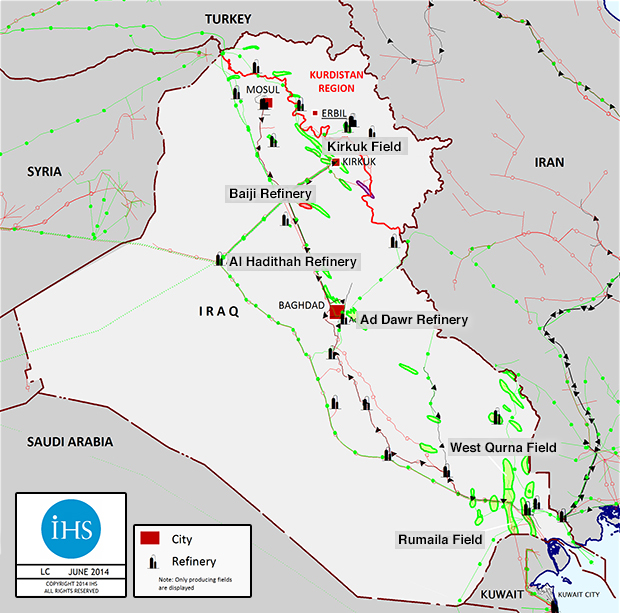Kurds boost oil exports as Iraq crisis deepens
The fast-moving insurgency in Iraq appears to be changing by the hour, and is keeping diplomats, military planners, economists and corporate managers around the world quite busy as they attempt to plot out what might happen next.
While militants with the Islamic State of Iraq and the Levant, or ISIL (also known as ISIS) battle Iraqi government forces for control of a key oil refinery in the country's northern region, there are concerns that Iraq is breaking up along religious and cultural lines.
Despite the turmoil, some locals might ultimately benefit from the outcome of the fighting: Iraq's Kurdish population.
The Kurds suffered terribly after an attempted uprising against Saddam Hussein at the end of the first Gulf War in 1991. Thanks in part to the imposition of a no-fly zone by western coalition forces at the time, the Kurds of northern Iraq have been able to establish a relatively autonomous, prosperous and peaceful region, known as the Kurdistani Regional Government (KRG) or Iraqi Kurdistan. And so far, there have been only minor skirmishes reported between the KRG peshmerga militia and ISIL forces.
Iraq's current oil production is about three million barrels daily. While most of that oil is exported through the Persian Gulf port of Basra, in the south, a sizable portion has been exported through Iraqi Kurdistan by pipeline to a port in Turkey.
Just last month and despite protests from the Baghdad government, which claims the only authority to sell Iraqi oil, the KRG started its own, independent exports through Turkey. Sarah Haggas, regional manager, Middle East, for research firm IHS Energy, says the Kurdistan region is shipping oil via Turkey by truck and with a newly constructed pipeline.
"Operations are still underway in the Kurdistan region, and we have not had any reports of it being affected by the violence," she said in a client note.
"The Kurds know that Baghdad is weak, and in effect have forced [Iraqi Prime Minister Nouri al-] Malaki to concede and say, 'We hope you'll defend Iraqi territory,'" said Judith Yaphe, a visiting professor of international relations at George Washington University and a former senior analyst on Middle Eastern and Persian Gulf issues at the CIA.
"But the Kurds say, 'We've finally gotten back what is our land and we won't give it up again.'" she added.
Yaphe notes that, while the KRG is allowed to export 100,000 barrels of oil daily under an agreement with the Malaki government, they plan to greatly expand production.
"They're aiming ultimately for a million barrels a day," she said, "but that's assuming they will keep Kirkuk."
That city, which the Kurds consider their cultural capital, is also home to Iraq's fourth-largest oil field and is nominally under Kurdish control.
Even if oil exports are increased out of Iraqi Kurdistan, Yaphe says it won't be enough to affect the global energy market. Her concern, however, is what happens if Iraq becomes fractured into three or more separate countries, each with their own rival political and economic agendas.
Sheikh Ali Al-Hattam, a Kurdish tribal leader who's worked with the U.S. to fight Islamic militants, told CBS News that Iraq faces two options: splitting up or civil war, noting that dividing the country is preferable to fighting.
Oil prices have surged to a nine-month high as ISIL took control of several Iraqi cities and advanced toward Baghdad in recent days. The price of futures for Brent crude, rose to $115.71 a barrel in European trading on Thursday.
Securing America's Future Energy, a group that aims to reduce U.S. reliance on oil, is warning that instability in Iraq, along with other geopolitical events could leave the U.S. economy vulnerable to an "oil shock."
For now, however, oil prices remain fairly close to their $110 a barrel average since the "Arab Spring" protests broke out in 2011.
